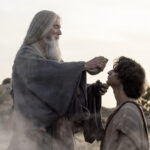When I heard the early singles from Jon Guerra’s new album, Keeper of Days, I suspected the album would be stellar. “Kingdom of God” felt like a Nick Drake folk song inspired by Scripture. “Citizens” was an anguished, prophetic reflection on “the meaning of Christian in this American life.” “Teach Us That One Song” (watch video below) captured the nostalgic pain that can often accompany maturing faith.
I also suspected I would love Guerra’s album when I heard he had written music for Terrence Malick’s A Hidden Life and was now living in Austin, Texas, working with Malick on music for his next film, the biblical period piece The Last Planet.
Guerra’s new album—released last Friday—did not disappoint. The follow-up to his 2015 album Little Songs, Keeper of Days is one of the best Christian records I’ve heard in years. He describes the genre as “devotional music,” which he says is “less Sunday morning worship music and more Monday morning prayer music.”
In this Q&A, Guerra describes what he means by “devotional music,” why Radiohead inspires him, and what it’s like to collaborate with Terrence Malick.
How would you describe “devotional music,” and how does it differ from what we typically find in contemporary Christian music?
“Devotional music” is a term I started using to describe songs that came from a particular place and that seem to have a particular quality—music birthed in quiet, and intended to be listened to in quiet (an early “Monday morning,” if you will). In the quiet, at my best, I have no motive or intention other than being with God as I write. The goal is to invite him to be with me, over and over again. I write and rewrite and record from that place. There is humdrum too, a lot of thorns and thistles along the way. But this mostly fades, and all that’s left is the sweet memory of being with God as I work.
Contemporary Christian Music (CCM) is usually about the Christian life in general, and it’s made to help people feel encouraged and positive throughout the week. It’s often written from a Christian person to a Christian person. The best CCM songs, in my opinion, have a devotional quality to them: from a person to God. To be sure, CCM ministers to people greatly, and I’m so grateful for that. I was plugged into the mainframe of the CCM matrix for about three years and saw firsthand how much good it does for people.
Devotional music is probably a bit closer to worship music (WM), in the sense that they’re both trying to facilitate something. But there are big differences. WM is liturgical—made to help congregations on Sundays worship together. The liturgical function of WM requires particular boundaries: singability, common language/words, common song arrangements (verse, chorus, verse, chorus, bridge, and so on), and collective relatability.
Devotional music, meanwhile, is highly personal. It has no practical boundary, just one large spiritual boundary: prayer. The music, language, style, and personal expression are, ideally, all alive with prayer. It takes cues from the Psalms. There’s room for darkness, doubt, ugliness, and self-exposure. There isn’t as much room for those things in a CCM or WM context, and for good reason, I think.
Are there other artists out there who you’d say are making devotional music in a similar vein?
There are many of us writing devotional music, though we’re all spread out. As far as I know, there are no conferences, radio stations, or record labels that act as a “home” for us. Many of us are also part-time worship leaders, so we’re kind of silo’ed in our respective churches. I’ve been loving Andy Squyres lately. And of course, Keith Green’s music.
Was there a guiding idea, theme, or mood you were going after in Keeper of Days? What ties this collection of songs together?
The guiding questions were, “Did this come from a place of prayer?” and “Would this help the listener pray?” Stylistically, I wanted a strong sense of cohesion, but not a strong sense of “genre.” When we hear “rock” or “pop” or whatever, we expect certain feelings to follow. I wanted to try and remove any cues for the listener so that they could have their own experience of the songs.
The title track, “Keeper of Days,” really ties everything together. If you listen all the way through, there is a sense of finality and completion when that song is over. Maybe it’s the last line, “Hear my prayer, my precious Lord and God.” I know people don’t really listen to music in album-order as much anymore, but I did intend for the listener to listen from start to finish, in one sitting, if possible. The songs unfold into each other as the album progresses.
You’ve talked about how many of your musical influences come from outside Christian music. What are some of these key influences? Why might listening to Radiohead make someone a better devotional or worship artist?
Key influences are the people and bands I listened to in high school and college: Radiohead, Rufus Wainwright, Bob Dylan, The Beatles, Jeff Buckley, Nick Drake, MxPx, Brahms, Bach, Rachmaninov. At any point in the record, I’m probably ripping off one of those people.
The Radiohead question is interesting. That band in particular has a fearlessness that is refreshing. They keep breaking out of their own cocoon. In recent years, I’ve had less of an appetite for the self-loathing or world-weary mood they often channel. But goodness, OK Computer and Amnesiac are so good. We would all do better to be a bit more fearless in our devotion, so yes, more Radiohead!
What non-musical artists have influenced you most?
Generally speaking, any artist with a spiritual impulse, Christian or not, is intriguing to me. I remember reading C. S. Lewis pretty young, and it blew me away. George Herbert is still regular reading. I can pick up Marilynne Robinson anytime and be a happy camper. Terrence Malick, Winslow Homer, Rothko, Christian Wiman. Now I’m just naming people I like.
Devotional music is highly personal. It has no practical boundary, just one large spiritual boundary: prayer.
In recent years, the work, and more so the lives, of William Blake and Robert Lax have kept me and my friends on the rails, so to speak. Their stuff is incredible, yet they lived, worked, and died in obscurity. It’s a good reminder that popularity isn’t the only measure for success.
What does the process look like to make music for a Terrence Malick film? Can you say anything about what we can expect from The Last Planet?
Working on A Hidden Life was a huge honor for me and Valerie, my wife. She is an excellent violinist, and we recorded hours of string music for the film. The process for that film and this current one is slow, with a lot of experimenting. I’ve learned not to rush, and not to be too picky about any one thing. We’re all here to serve the whole, however we’re able.
I can’t say anything about this next film except that it rules!
I like what you say about quietness, how your music is a “collaboration with quiet.” How can we reclaim quiet in a world of constant, buzzing distraction?
We reclaim it by first acknowledging its value. The world is so loud. Our minds are so loud. But 1 Thessalonians 4:11 says, “Aspire to live quietly.” How lovely would it be if we, as Christians, were known as the “quiet ones”?
Getting up early to have time alone helps, though with kids this is hard. I feel more open to God in the early hours. I have a friend who does “no-electronics Saturdays” as a sabbath practice with his wife and three kids. He can’t stop raving about it. Another good option is rhythmic prayer, for example, morning and evening prayers. I find that a strong, ongoing rhythm helps me want more of God.
“The Most Practical and Engaging Book on Christian Living Apart from the Bible”
 “If you’re going to read just one book on Christian living and how the gospel can be applied in your life, let this be your book.”—Elisa dos Santos, Amazon reviewer.
“If you’re going to read just one book on Christian living and how the gospel can be applied in your life, let this be your book.”—Elisa dos Santos, Amazon reviewer.
In this book, seasoned church planter Jeff Vanderstelt argues that you need to become “gospel fluent”—to think about your life through the truth of the gospel and rehearse it to yourself and others.
We’re delighted to offer the Gospel Fluency: Speaking the Truths of Jesus into the Everyday Stuff of Life ebook (Crossway) to you for FREE today. Click this link to get instant access to a resource that will help you apply the gospel more confidently to every area of your life.


































